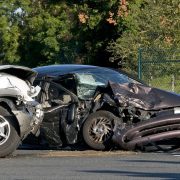Do you have a traumatic brain injury or concussion?
Sandra was rear-ended while stopped at a red light. The sudden impact caused her neck to be thrown forward and then backward, hitting the headrest – she unknowingly suffered an injury known as whiplash. Sandra was late to an appointment, and since her bumper only had a small dent, she exchanged information with the careless driver in case her insurance company needed it and went on her way.
The next day, she woke up with a headache. She took over-the-counter pain medication and tried to go about her daily living. Over the next couple of days, Sandra progressively suffered from more severe headaches and was having trouble concentrating at work. She wasn’t suffering from problems with her range of motion and didn’t have much neck pain or back pain, so she didn’t think she needed medical attention. Her husband complained that she had not been herself since the collision and was acting forgetful and irritable.
At the urging of her family, she finally made an appointment with a neurologist for medical treatment. He explained to her that she sustained a whiplash injury which caused a concussion. He further explained that traumatic brain injuries (known as TBIs), such as concussions, are common following an auto accident or other traumatic event and can cause whiplash headaches, among other short-term and long-term issues. Her neurologist prescribed a treatment plan, and the headaches gradually resolved over a couple of months. Some people may not be as lucky – post-concussion syndrome can lead to chronic headaches or post-traumatic headaches which may become a long-term problem following car accidents.
A “Minor” Car Accident May Not Be So Minor
Do not let seemingly “minor” accidents fool you. A car crash vehicle may have no visible damage, and victims may not have broken bones. However, it is still possible for those accident victims to sustain a closed head injury such as a concussion.
Up to 75% of traumatic brain injuries do not appear in radiological studies such as CT Scans. Such injuries can have permanent consequences, especially if not treated properly. If you have any of the following symptoms after a car accident, you should seek immediate medical attention from a neurologist as you may have a serious injury:
- Headaches or head pain
- Memory loss
- Depression
- Blurriness or visual disturbances
- Dizziness
- Dysfunction at work
- Hearing or vision loss
- Lethargy
- Sleep loss
- Anxiety
- Irritability
- Restlessness
The personal injury team at Dross Berman LLC has experience representing victims of traumatic brain injuries. We have worked with many of the best neurologists in the DMV area to help evaluate you and provide medical care for your accident injuries. If you are the victim of an accident and are suffering from headaches after the accident, or if you believe you may have sustained a traumatic brain injury, call our office for a free consultation and evaluation of your case.








